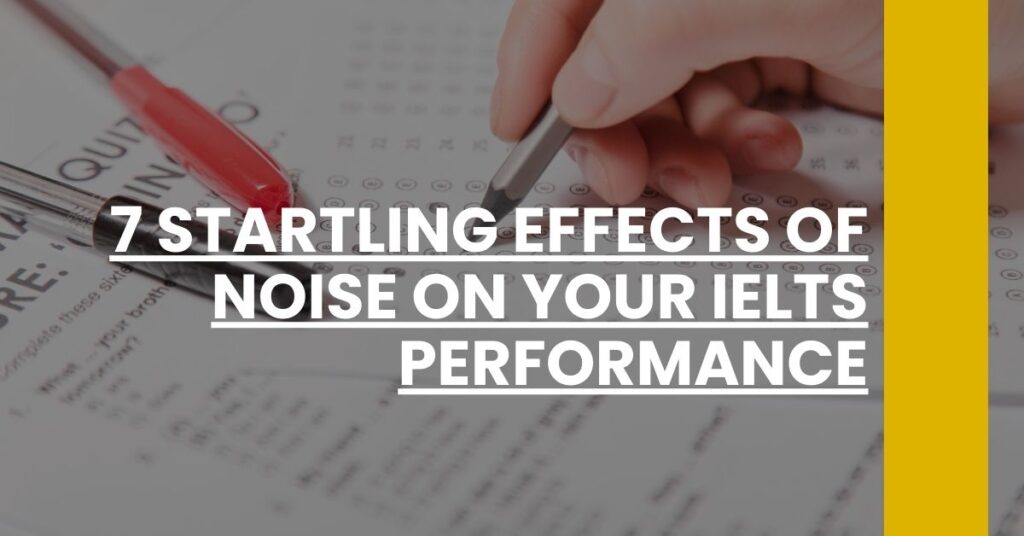Have you ever considered how the hum of traffic or the chatter in a café could derail your IELTS dreams? Noise isn’t just an annoyance—it could be the unseen barrier between you and your ideal score.
In this article, we examine the surprising effects of noise on IELTS performance. You’ll discover how sound influences everything from your concentration to memory recall, plus strategies to safeguard your focus against auditory intrusions.
- 1. Concentration Disruption
- 2. Increased Anxiety Levels
- 3. Effects on Speaking Performance
- 4. Impact on Listening Comprehension
- 5. Noise-Induced Fatigue
- 6. Timing and Pacing Challenges
- 7. Memory Recall and Retention
- Minimizing Noise Distractions
- Understanding the IELTS Exam Environment
- Strategies for Improving Focus Amidst Noise
- Conclusion: Turning Down the Volume on Test Day
1. Concentration Disruption
Distractions can be a study’s worst enemy, and when you’re preparing for the IELTS, losing your train of thought can have real consequences. Ambient sounds may not only irritate you but can also lead to more profound effects on your concentration levels.
- Interference with Task Performance: The persistent hums and buzzes commonplace in urban settings can interfere with how you perform task-specific activities, particularly those requiring heightened cognitive control. This includes the challenging reading and listening sections of the IELTS where focus is paramount.
- Agitation Over Time: As the clock ticks down during your exam, irritability can build due to background noise, diminishing your concentration incrementally and influencing your overall score.
- Rumbly Noises: Distinct sounds such as chatter or traffic are formidable disruptors. However, it’s the less obvious low-frequency noises, often described as ‘rumbly,’ that can contribute significantly to a decline in your concentration, indirectly affecting the outcome of your IELT’s performance.
Creating a quiet study environment can help mitigate these effects, but remember it’s also essential to practice under conditions that mirror potential test scenarios. This could mean occasionally studying in less than perfect silence to build your tolerance to these types of distractions, which could be the unexpected effects of noise on your IELTS experience.
2. Increased Anxiety Levels
Noise isn’t just a distraction; it can also be a significant stressor. Consistent background noise has been linked to psychological and physiological stress, impacting not only your mental health but potentially your IELTS results as well.
- Heightened Stress Response: A study on environmental noise discovered that a noisy backdrop increases diastolic blood pressure – a clear indication of stress – and reduces your ability to communicate effectively. This can be detrimental in scenarios like the IELTS exam, where clear thought and communication are crucial.
- Interference with Test Performance: Even subtle noises can elevate anxiety levels, creating a state of hyperarousal that might hinder your ability to think critically and respond calmly to exam questions.
It’s important to develop stress management techniques – such as deep breathing or mindfulness exercises – to keep these anxiety levels in check on the day of your exam. Not only will these skills serve you well in the IELTS, but they’re also transferable to other high-pressure situations.
3. Effects on Speaking Performance
Your performance in the speaking section of the IELTS could be affected not just by how well you’ve mastered the English language, but also by the level of environmental noise during the examination. Good communication isn’t just about fluency; it requires the ability to think quickly and respond coherently – abilities that noise can disrupt.
- Fluency and Coherence: Constant distraction from ambient noise can break your train of thought, resulting in pauses and hesitations that can affect the fluency and coherence of your speech.
- Learning and Comprehension: It’s been shown that background noise impairs speech comprehension, making it harder for you to pick up on and respond to nuanced prompts or questions.
Try simulating a noisy exam environment during your practice sessions to enhance your resilience to these environmental factors. By preparing in this way, you can help ensure that on test day, you remain calm, clear-headed, and ready to showcase your true speaking abilities.
4. Impact on Listening Comprehension
The listening section of the IELTS is all about comprehension – can you understand what’s being said to answer questions accurately? This can be heavily impacted by noise. Your ability to tune into the recording and tune out any ambient noise is crucial.
- Perceived Disturbance: Research indicates that background speech affects performance negatively, challenging your concentration and understanding. Whether it’s a cough, a sneeze, or a door closing, any sound can be a potential distraction.
- Affects on Cognitive Load: When your brain is working overtime to filter out unwanted sounds, your cognitive load increases, making it harder to process and retain information.
To enhance your listening skills, incorporate audio materials with varying background noises in your study regimen. This can train your ear and your brain to focus on what’s important, allowing you to maintain comprehension despite the chaos of your surroundings.
5. Noise-Induced Fatigue
You might not immediately think of fatigue as one of the effects of noise on your IELTS score, but it can be a silent performance killer. Extended exposure to environmental noise is not only annoying, but it can also be downright exhausting, draining your energy reserves before you even realize it.
- Cognitive Performance Impact: Studies have highlighted that noise can affect cognitive performance, altering the way you approach tasks and potentially leading to decision fatigue.
- Strategic Response Changes: When faced with constant noise, you have to work harder to concentrate. This can change the way you respond to questions, perhaps causing you to choose quicker – but less accurate – answers due to cognitive strain.
Integrating periods of rest and silence into your study routine can help combat this fatigue. Also, practising relaxation techniques and ensuring you get a good night’s rest before the exam can help bolster your energy and maintain your cognitive stamina.
6. Timing and Pacing Challenges
One of the subtler effects of noise on IELTS test-takers is its impact on timing and pacing. The IELTS, like most standardized tests, is not only a measure of your English language proficiency but also your ability to manage time effectively. In an environment laced with auditory distractions, your well-practiced pacing strategies could go awry.
- Disrupted Timing Strategies: Noise can force you to reread passages or replay questions in your mind, eating into the precious minutes you have allocated to each section.
- Distraction-Induced Delays: Reacting to unexpected noises diverts attention and causes momentary delays – and even a few seconds lost repeatedly can add up to a significant deficit.
To navigate these timing and pacing challenges, consider incorporating timers into your practice sessions, creating a sense of urgency that mimics exam conditions. Simulate the unpredictability of potential noise disturbances by practicing in different environments. These techniques will aid you in developing a robust sense of timing that stands firm, even when unplanned noises attempt to throw you off course.
7. Memory Recall and Retention
The ability to recall information swiftly and accurately is a cornerstone of high IELTS performance. But did you know that environmental noise could muddy the waters of memory, making the recall and retention you rely on less accessible?
- Detriment to Memory Recall: According to a study on memory recall, noise exposure during recall phases deteriorated participants’ ability to remember information.
- Retention Strain: Constant auditory stimulation can overwhelm the brain, challenging your ability to hold and retrieve pertinent data during the IELTS exam.
Developing a quiet, controlled study space is essential, but so is preparing your memory to withstand the pressures of noise. Try information retrieval exercises, like self-quizzing in various environments, to fortify your memory against the disruptive effects of noise.
Minimizing Noise Distractions
Combatting the effects of noise on your IELTS performance isn’t just about coping – it’s about strategizing. There are practical steps you can take to minimize noise disruptions and protect your concentration.
- Selective Study Spaces: Opt for quiet areas to study, like a local library or a reserved study room, where you can control the sound environment to some extent.
- Noise-Canceling Headphones: These can be a game-changer, especially during your self-study sessions. They can help you create an oasis of silence, even in noisy surroundings.
- Earplugs on Test Day: Some test centers may allow earplugs, which can help reduce the impact of ambient noise and keep you locked into the task at hand.
Remember, arming yourself with noise-reducing accessories can provide you with the serenity you need to stay on track with your IELTS preparation and performance.
Understanding the IELTS Exam Environment
Knowing what to expect when you walk into your IELTS examination can relieve anxiety and provide clarity. It’s not just about grappling with potential noise; it’s also about understanding your rights and the typical exam settings.
- Standardized Test Environment: Generally, IELTS test centers aim to provide a controlled environment with minimal noise distractions. Still, unexpected noises are not out of the ordinary.
- Requesting Accommodation: If you have concerns about noise and its impact on your performance, you can inquire about accommodations, such as sitting in a room with fewer test-takers, for a quieter atmosphere, much like the options available in other standardized tests.
It’s worth visiting the test center in advance if possible, or requesting information about the setup, to ensure you’re as prepared as you can be for the environment on test day.
Strategies for Improving Focus Amidst Noise
Improving focus in the face of noise is not just a skill—it’s an art. With targeted exercises and purposeful practice, you can fortify your attention span, bolstering your defense against the inescapable clamor of daily life.
- Cognitive Training Apps: Engage with apps designed to enhance concentration and focus through mental exercises.
- Meditation and Mindfulness: These practices can be immensely beneficial in cultivating an inner calm that can withstand external chaos.
- Study Sessions Amidst Distractions: Practice working through sample tests with background noise to train your brain to filter out irrelevant stimuli.
By developing these strategies and incorporating them into your study habits, you can enhance your ability to concentrate regardless of the environment. This skill is invaluable, not just for the IELTS, but for navigating the noise of everyday life.
Conclusion: Turning Down the Volume on Test Day
Mastering the IELTS means mastering the environment in which you take the test. The effects of noise on IELTS results are significant, but with intentional preparation, you can mitigate these unwanted auditory intrusions. Whether it’s investing in noise-canceling headphones for your study sessions, incorporating auditory distractions in your preparation, or simply being aware of what to expect, you have the power to turn down the volume on test day and let your abilities shine through.
Effects of noise on IELTS: Discover how auditory distractions negatively impact test performance, focus, and stress levels for candidates.

